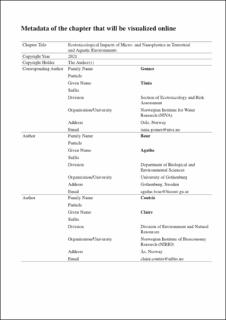| dc.description.abstract | Plastic pollution is a widespread environmental problem that is currently one of the most discussed issues by scientists, policymakers and society at large. The potential ecotoxicological effects of plastic particles in a wide range of organisms have been investigated in a growing number of exposure studies over the past years. Nonetheless, many questions still remain regarding the overall effects of microplastics and nanoplastics on organisms from different ecosystem compartments, as well as the underlying mechanisms behind the observed toxicity. This chapter provides a comprehensive literature review on the ecotoxicological impacts of microplastics and nanoplastics in terrestrial and aquatic organisms in the context of particle characteristics, interactive toxicological effects, taxonomic gradients and with a focus on synergies with associated chemicals. Overall, a total of 220 references were reviewed for their ful!lment of speci!c quality criteria (e.g. experimental design, particle characteristics, ecotoxicological endpoints and !ndings), after which 175 were included in our assessment. The analysis of the reviewed studies revealed that organisms’ responses were overall in"uenced by the physicochemical heterogeneity of the plastic particles used, for which distinct differences were attributed to polymer type, size, morphology and surface alterations. On the other hand, little attention has been paid to the role of additive chemicals in the overall toxicity. There is still little consistency regarding the biological impacts posed by plastic particles, with observed ecotoxicological effects being highly dependent on the environmental compartment assessed and speci!c morphological, physiological and behavioural traits of the species used. Nonetheless, evidence exists of impacts across successive levels of biological organization, covering effects from the subcellular level up to the ecosystem level. This review presents the important research gaps concerning the ecotoxicological impacts of plastic particles in different taxonomical groups, as well as recommendations on future research priorities needed to better understand the ecological risks of plastic particles in terrestrial and aquatic environments. | en_US |
